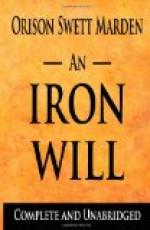“Every condition, be it what it may,” says Channing, “has hardships, hazards, pains. We try to escape them; we pine for a sheltered lot, for a smooth path, for cheering friends, and unbroken success. But Providence ordains storms, disasters, hostilities, sufferings; and the great question whether we shall live to any purpose or not, whether we shall grow strong in mind and heart, or be weak and pitiable, depends on nothing so much as on our use of the adverse circumstances. Outward evils are designed to school our passions, and to rouse our faculties and virtues into intenser action. Sometimes they seem to create new powers. Difficulty is the element, and resistance the true work of man. Self-culture never goes on so fast as when embarrassed circumstances, the opposition of men or the elements, unexpected changes of the times, or other forms of suffering, instead of disheartening, throw us on our inward resources, turn us for strength to God, clear up to us the great purpose of life, and inspire calm resolution. No greatness or goodness is worth much, unless tried in these fires.”
[Illustration: BENJAMIN DISRAELI
(Earl of Beaconsfield),
English Statesman and Novelist.
b. London, 1804; d. London, 1881.]
Better to stem with
heart and hand
The roaring
tide of life, than lie,
Unmindful, on its flowery
strand,
Of God’s
occasions drifting by!
Better with naked nerve
to bear
The needles of this
goading air,
Than in the lap of sensual
ease forego
The godlike power to
do, the godlike aim to know.
Whittier.
CHAPTER VII.
THE DEGREE OF “O.O.”
When Moody first visited Ireland he was introduced by a friend to an Irish merchant who asked at once:
“Is he an O.O.?”
“Out and Out”—that was what “O.O.” stood for.
“Out and Out” for God—that was what this merchant meant. He indeed is but a wooden man, and a poor stick at that, who is decided in everything else, but who never knows “where he is at” in all moral relations, being religiously nowhere.
The early books of the Hebrews have much to say about
“The Valley of
Decision” and the development of “Out
and Out” moral character.
Wofully lacking in a well-balanced will power is the man who stands side by side with moral evil personified, in hands with it, to serve it willingly as a tool and servant.
Morally made in God’s image, what is more sane, more wholesome, more fitting, for a man than his rising up promptly, decidedly, to make the Divine Will his own will in all moral action, to take it as the supreme guide to go by? It is the glory of the human will to coincide with the Divine Will. Doing this, a man’s Iron Will, instead of being a malignant selfish power, will be useful in uplifting mankind.
God has spoken, or he has not spoken. If he has spoken, the wise will hear.




